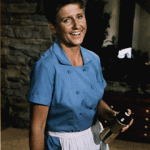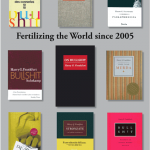So, STA used to be surprised by the crazy connections I would make between philosophers, critical theorists and popular TV and movies or how I could interpret and express my own everyday experiences through the words and theories of Judith Butler. Not anymore. For anyone else reading this blog, I offer this entry as a good example of how my brain works. In this entry, I contrast an ethics of troublemaking (inspired by Judith Butler) with a feminist ethics of care, sprinkle in some Michel Foucault (and his idea of the caring and curious masked philosopher) and apply it to Dr. Seuss and Horton Hears a Who. Crazy? Perhaps. Unique? Always. Without further ado, I bring you Horton as the caring troublemaker…
If you can’t see it, hear it, or feel it, it doesn’t exist. Our way of life is under attack. And whose leading that attack? HORTON! Are we going to let troublemakers like Horton poison the minds of our children? When Horton tells our children about worlds beyond the jungle he makes them question authority which leads to defiance which leads to ANARCHY!
These are the words of the Sour Kangaroo (but only in the movie–they aren’t in the book) as she implores the other animals in the jungle of Nool to help her stop Horton. She condemns him as a troublemaker who is out to destroy their way of life and to poison the minds of their children. But what is it about his actions that causes trouble for her? Why is she so angry and frightened and threatened by him? It is not just that he thinks differently or that he sees and hears things (like tiny worlds on small specks on flowers) that others don’t. It is that he refuses to fall in line and obey the rule of their society (at least according to the Sour Kangaroo): If you can’t see it or hear it or feel it than it doesn’t exist.
Horton is condemned as a troublemaker because he makes a choice to disobey what he finds to be wrong (as inaccurate and not properly reflecting his own observations of people on the speck) and unjust. So, the troublemaking part of his action is not only (or even mostly) that he is open to other ways of thinking about the world–ways that are counter to common sense like little worlds or specks that talk, but that he refuses to deny those ways and defiantly claims their value and humanity—a person’s a person, no matter how small. Fundamental to Horton’s troublemaking is a sense of justice and attentiveness to others who he witnesses being treated unfairly and/or that are in need of care. In this sense, he makes trouble by getting into trouble (thinking about the world differently, seeing worlds on specks) and then by staying in trouble (refusing to ignore or deny those specks).
Consider a scene early in the movie (the chapter is titled, “Making Trouble”) when the Kangaroo confronts and threatens Horton. She commands him to stop treating the speck as if it had a world on it and to tell everyone else that he was making it up. If he doesn’t, she warns, he will be in for an ugly fight (and big, big trouble). So, he better hand over the flower and the speck. His reply:
No! I can’t give it to you. There are people on this speck. Granted, they’re very small people. But a person’s a person, no matter how small.
In this scene, the real trouble for Horton is that he refuses to get himself out of trouble even when doing so puts him in danger of being ostracized or worse by the other animals. He stays in trouble not because he is eager to anger the Kangaroo or because he is bored and wants to make life more interesting (or thrilling) for himself. No, he stays in trouble because the alternative is to ignore the voices of others and to let them perish. To get himself out of trouble Horton would not only have to turn his back on the Whos, but he would have to deny that they ever existed. This denial (that is, the refusal to recognize this other world) would strip the Whos of their humanity/humanness. For, how could they have humanity if they don’t even exist, if they are only figments of Horton’s imagination?
What I find interesting about Horton’s troublemaking in this story is how it is inextricably tied to his passion for justice and his openness to other worlds and ways of being/living. This suggests that troublemaking (as in, making trouble for those in power, for the status quo, for rigid rules) can be motivated by something other than rebellion, destruction, or deliquency. Troublemaking is motivated by a sense of moral responsibility towards/for others, by an ethical need to work for more just societies, and by a desire to care (for and about) the world and all of its inhabitants (especially the smallest).
Yes, I think that in this film Horton is a great example of a caring troublemaker. We can see this care in a couple of different ways. In one sense, he is giving care to the Whos on the speck–he cares about their world and he takes care to ensure that that world remains safe and viable. But, there is another sense of care happening in this story–a type of care that is not just about the attention and the help that Horton gives to the Whos and their speck of a world. This type of care is not about specific actions but about an approach/attitude to the world; this type of care refers to the quality of one’s character as someone who cares and is curious about the different possibilities of life that our worlds offer.
In “The Masked Philsopher,” Michel Foucault describes curiosity and the care it suggests:
[Curiosity] evokes ‘care’; it evokes the care one takes of what exists and what might exist; a sharpened sense of reality, but one that is never immobilized before it; a readiness to find what surrounds us strange and odd; a certain determination to throw off familiar ways of thought and to look at the same things in a different way; a passion for seizing what is happening now and what is disappearing; a lack of respect for the traditional hierarchies of what is important and fundamental.
From the beginning of the story (in the book and both versions–1970 and 2008–of the movie) Horton exhibits the qualities of curiosity-as-care. Here, let me break it down in terms of the 2008 version. First, let me offer a scene from early on in the movie. Horton is trying to explain to the Sour Kangaroo why he is talking to a speck of dust on a flower:
Kangaroo: That’s absurd. There aren’t people that small!
Horton: Well, maybe they aren’t small. Maybe we’re big.
Kangaroo: Horton!
Horton: No, really. Think about it. What if there was someone way out there looking down on our world right now? And to them, we’re the specks.
Kangaroo: Horton! There is nothing on that speck!
Horton: But I heard.
Kangaroo: Did you, really? Ohhoho my. Then how come I don’t hear anything?
Horton: Well…hmmm…
Kangaroo: If you can’t see, hear, or feel something it doesn’t exist. And believing in tiny, imaginary people is just not something we do or tolerate here in the jungle of Nool.
Foucault: it evokes the care one takes of what exists and what might exist; a sharpened sense of reality, but one that is never immobilized before it
Horton: Horton is interested in and attentive to the world around him and open to imagining new possibilities. His sharpened (and heightened) sense of reality enables him to hear the tiny cry coming from a small speck floating by as he is bathing in the stream. Instead of not hearing (or more common, hearing but refusing to listen), Horton listens and responds to the voice that signals the possibility of another world beyond his, a world that seems unimaginable within his world (with its empirical, physical and “natural” laws). He is not threatened or even incredulous at the possibility of a tiny world on a speck; it does not immobilize him. Instead it sparks his curiosity and his imagination about what lies beyond his own observations.
Foucault: a readiness to find what surrounds us strange and odd
Horton: Horton is ready and willing to be open to how our surroundings, such as flowers, trees, specks of dust, may not be what they appear to be. They may be strange and strangers to us (we don’t really know them or what they are).
Foucault: a certain determination to throw off familiar ways of thought and to look at the same things in a different way
Horton: Once he hears the voice and believes there that there is a small person on the speck, he is committed to never look at flowers and dust (or the world, for that matter) the same way again. He is committed to staying open to the possibility of other worlds (ones that are smaller and bigger than us).
Foucault: a passion for seizing what is happening now and what is disappearing
Horton: [a stretch perhaps?] Horton is unwilling to let the moment pass and the speck of dust and its inhabitants to perish. When he hears the small voice crying for help, he acts immediately.
Foucault: a lack of respect for the traditional hierarchies of what is important and fundamental.
Horton: Horton refuses to honor the jungle of Nool rule (at least as created and enforced by the Sour Kangaroo): If it you can’t see, hear, or feel it then it doesn’t exist. He steadfastly stands behind his (empirically unproven) claim that there are people on the speck of dust.
Now, this kind of care–the care for remaining open and interested/attentive to the world in its different permutations–is not often recognized as such. Maybe that is because care-as-curiosity is hardly ever about being careful. It is exhausting, dangerous and quite frequently gets us into trouble (and demands that we stay in trouble by being resistant to rigid rules and ready for new possibilities). But, what if we imagined the type of troublemaking and troublestaying that Horton is doing as an ethics of care? Then, could we begin to value (and honor and promote) troublemaking?


